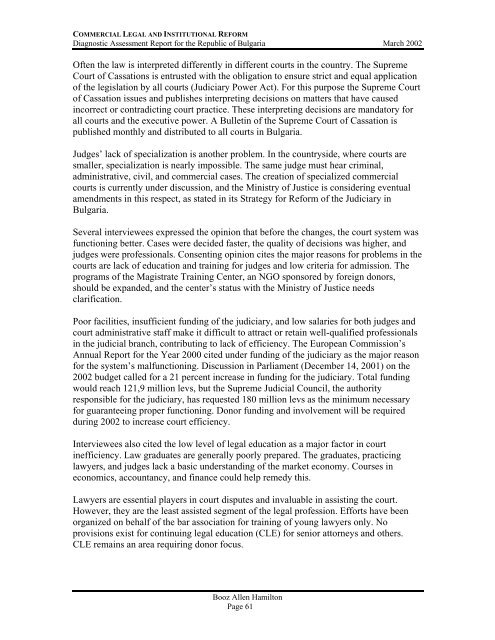Commercial Legal And Institutional Reform (CLIR) - Economic Growth
Commercial Legal And Institutional Reform (CLIR) - Economic Growth
Commercial Legal And Institutional Reform (CLIR) - Economic Growth
You also want an ePaper? Increase the reach of your titles
YUMPU automatically turns print PDFs into web optimized ePapers that Google loves.
COMMERCIAL LEGAL AND INSTITUTIONAL REFORM<br />
Diagnostic Assessment Report for the Republic of Bulgaria March 2002<br />
Often the law is interpreted differently in different courts in the country. The Supreme<br />
Court of Cassations is entrusted with the obligation to ensure strict and equal application<br />
of the legislation by all courts (Judiciary Power Act). For this purpose the Supreme Court<br />
of Cassation issues and publishes interpreting decisions on matters that have caused<br />
incorrect or contradicting court practice. These interpreting decisions are mandatory for<br />
all courts and the executive power. A Bulletin of the Supreme Court of Cassation is<br />
published monthly and distributed to all courts in Bulgaria.<br />
Judges’ lack of specialization is another problem. In the countryside, where courts are<br />
smaller, specialization is nearly impossible. The same judge must hear criminal,<br />
administrative, civil, and commercial cases. The creation of specialized commercial<br />
courts is currently under discussion, and the Ministry of Justice is considering eventual<br />
amendments in this respect, as stated in its Strategy for <strong>Reform</strong> of the Judiciary in<br />
Bulgaria.<br />
Several interviewees expressed the opinion that before the changes, the court system was<br />
functioning better. Cases were decided faster, the quality of decisions was higher, and<br />
judges were professionals. Consenting opinion cites the major reasons for problems in the<br />
courts are lack of education and training for judges and low criteria for admission. The<br />
programs of the Magistrate Training Center, an NGO sponsored by foreign donors,<br />
should be expanded, and the center’s status with the Ministry of Justice needs<br />
clarification.<br />
Poor facilities, insufficient funding of the judiciary, and low salaries for both judges and<br />
court administrative staff make it difficult to attract or retain well-qualified professionals<br />
in the judicial branch, contributing to lack of efficiency. The European Commission’s<br />
Annual Report for the Year 2000 cited under funding of the judiciary as the major reason<br />
for the system’s malfunctioning. Discussion in Parliament (December 14, 2001) on the<br />
2002 budget called for a 21 percent increase in funding for the judiciary. Total funding<br />
would reach 121,9 million levs, but the Supreme Judicial Council, the authority<br />
responsible for the judiciary, has requested 180 million levs as the minimum necessary<br />
for guaranteeing proper functioning. Donor funding and involvement will be required<br />
during 2002 to increase court efficiency.<br />
Interviewees also cited the low level of legal education as a major factor in court<br />
inefficiency. Law graduates are generally poorly prepared. The graduates, practicing<br />
lawyers, and judges lack a basic understanding of the market economy. Courses in<br />
economics, accountancy, and finance could help remedy this.<br />
Lawyers are essential players in court disputes and invaluable in assisting the court.<br />
However, they are the least assisted segment of the legal profession. Efforts have been<br />
organized on behalf of the bar association for training of young lawyers only. No<br />
provisions exist for continuing legal education (CLE) for senior attorneys and others.<br />
CLE remains an area requiring donor focus.<br />
Booz Allen Hamilton<br />
Page 61

















